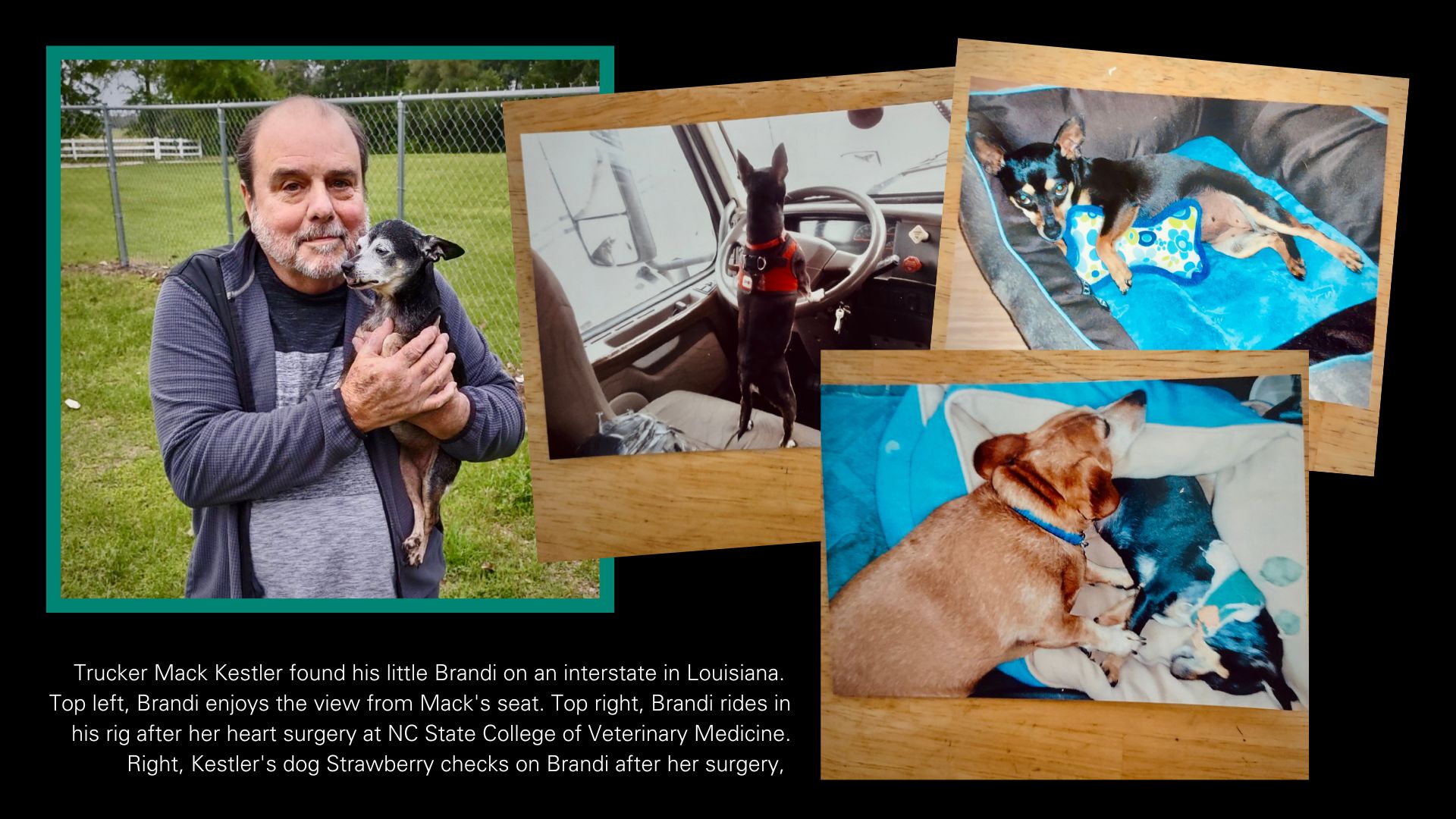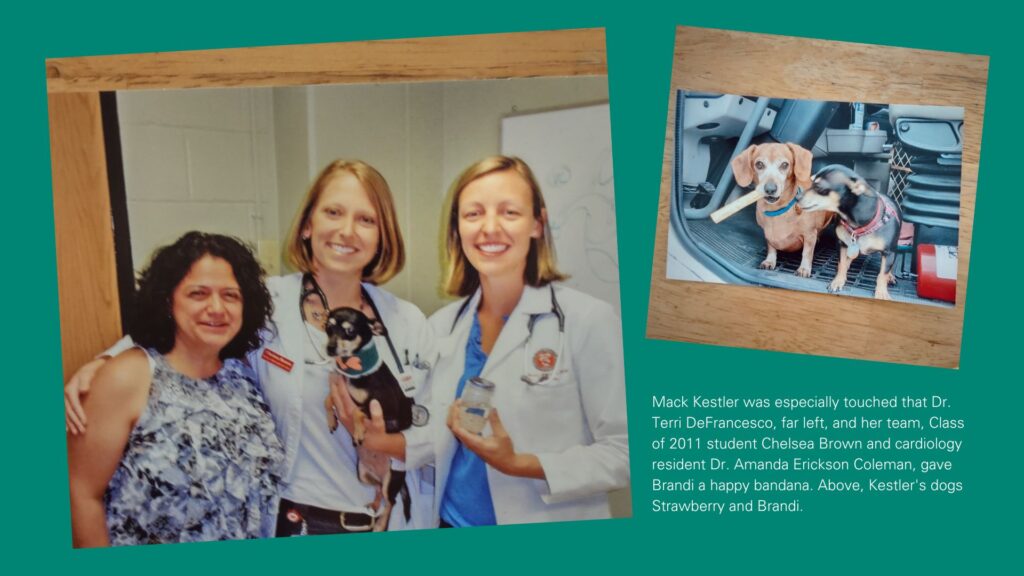A Decade-Plus Later, A Heartfelt Thank You to NC State Cardiologist
“Then I randomly got an email saying, ‘Just wanted to say, Brandi is still kicking, and I wanted to thank you.’ That’s amazing."

When an email from Mack Kestler, a Florida truck driver, arrived unexpectedly in her inbox, Dr. Terri DeFrancesco easily conjured up fond memories of him and his little dog Brandi even though nearly 13 years had passed since their last encounter.
An incredibly nice man, she recalled, salt of the earth. Critically ill dog he had found abandoned on a highway. An 18-wheeler taking up nearly all of the parking spaces in front of the NC State College of Veterinary Medicine’s Health and Wellness Center when he arrived with the dog seeking help.
“I hadn’t heard from Mr. Kestler since we said goodbye in July 2010,” says DeFrancesco, professor of cardiology and critical care. “Then I randomly got an email saying, ‘Just wanted to say, Brandi is still kicking, and I wanted to thank you.’ That’s amazing. That’s an amazing thing. This dog was close to death when we got her.”
Kestler, now retired at age 70, had glimpsed the Chihuahua running around a grassy median on Interstate 12 during an eastward run through Louisiana. As the animal lover had done countless times, Kestler took the next exit, turned around, traveled westward, took the next exit and started back the way he had been going to make sure the dog was OK.
“I pulled over on the shoulder and set the brakes,” says Kestler, currently the companion to four rescued dogs though he has had as many as six. “I’m a pretty good sized guy, so me running up the median in the middle of the summer was a sight.”
The chase along a busy highway included the dog running between Kestler’s legs and heading into oncoming traffic, Kestler running into the road after her, horns blowing, people swerving, and the dog bolting into a stand of trees before being subdued.
“She was snarling like she wanted to bite me,” Kestler says. “I didn’t have anything with me, so I pulled my T-shirt off, threw it over her and picked her up, and that was it. She was my sweetheart from then on out.”
Once he got the dog he named Brandi home to Jacksonville, Florida, he realized something was seriously wrong with her. She was coughing, and her urine was bloody. He took her immediately to a 24-hour emergency veterinarian, who said Brandi had a severe heart murmur and referred him elsewhere in Florida.
At the new facility the same night, he heard that there was only a 50-50 chance Brandi would survive and that the only veterinarians on the East Coast who could help her would be at the NC State College of Veterinary Medicine.
Kestler let his employer know that he needed his next truck run to go through North Carolina because 50-50 odds were good enough for him.
“They routed me up there, and that’s when I walked in with her,” says Kestler, who repeatedly calls Brandi his little sweetheart or baby. “Bless her heart. She was real fragile.”

What DeFrancesco found after she took Brandi from Kestler’s arms was a dog whose heart was clogged with worms and in the early stages of Caval syndrome, a life-threatening condition that heartworm disease causes.
The NC State College of Veterinary Medicine is one of only a few places in the country that will treat Caval syndrome, DeFrancesco says. She explained to Kestler that the needed procedure would still give Brandi only a 50-50 chance, again enough for the smitten Kestler to respond with an unequivocal yes.
“We go in with forceps and remove the worms from the heart,” DeFrancesco says. “I remember we pulled 18 worms from her heart, and she’s a tiny dog. I still have the echocardiogram of her heart. The heartworm pull thankfully was successful.”
On his way back to Florida a couple days later, Kestler stopped in Raleigh to retrieve his recovering baby. He was especially touched that DeFrancesco and her team, Class of 2011 student Chelsea Brown and cardiology resident Dr. Amanda Erickson Coleman, had put a happy bandana around Brandi’s neck.
“They were super sweet,” Kestler says of the NC State doctors. “Everybody there was. When I picked her up and saw her with that bandana with the hearts on it, I had to turn my head. I was going to get all mushy on ’em.”
DeFrancesco considers news of Brandi, now believed to be about 17 years old, to be fortuitous because April is National Heartworm Awareness Month. North Carolina is an endemic area, and pets should be taking heartworm preventatives year-round, she says.
“The old adage that a penny of prevention is worth a pound of cure definitely applies here,” she says. “Once a dog is in late stages of heartworm disease, it can be risky and expensive to treat. Certainly, a dog may not survive the procedure. The dog may also have complications that are long lasting.”
Since her time at NC State, Brandi has been nothing but Kestler’s healthy little love bug, riding shotgun in his rig with his Dachshund, another rescue named Strawberry, who recently passed away.
Kestler was sitting on his bed with Brandi, feeling blessed that she was still with him, when he decided he should reach out to Dr. T, as he calls DeFrancesco, after more than a decade.
“I just wanted to let Dr. T know Brandi was still alive and feisty as ever,” he says. “I’d just love to give her a hug and thank her for what she did. She saved my baby.”
- Categories:


